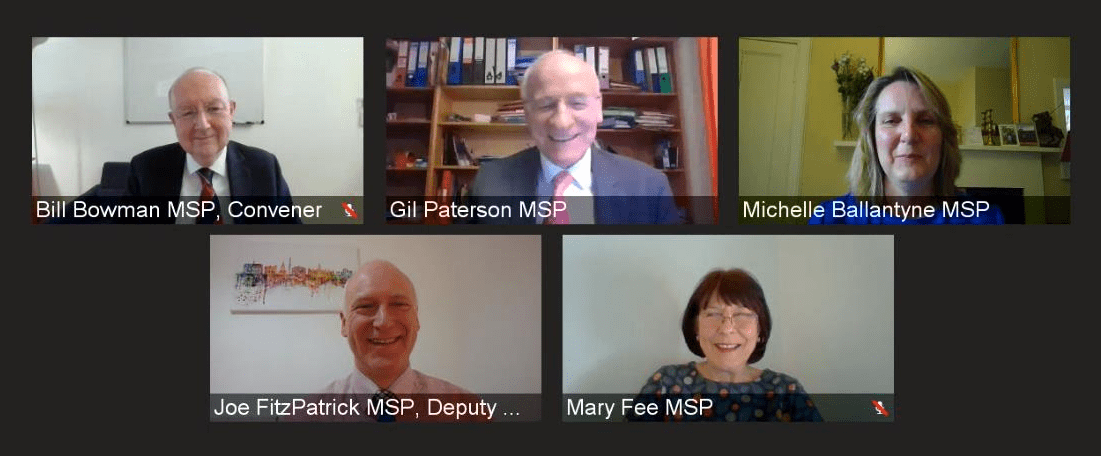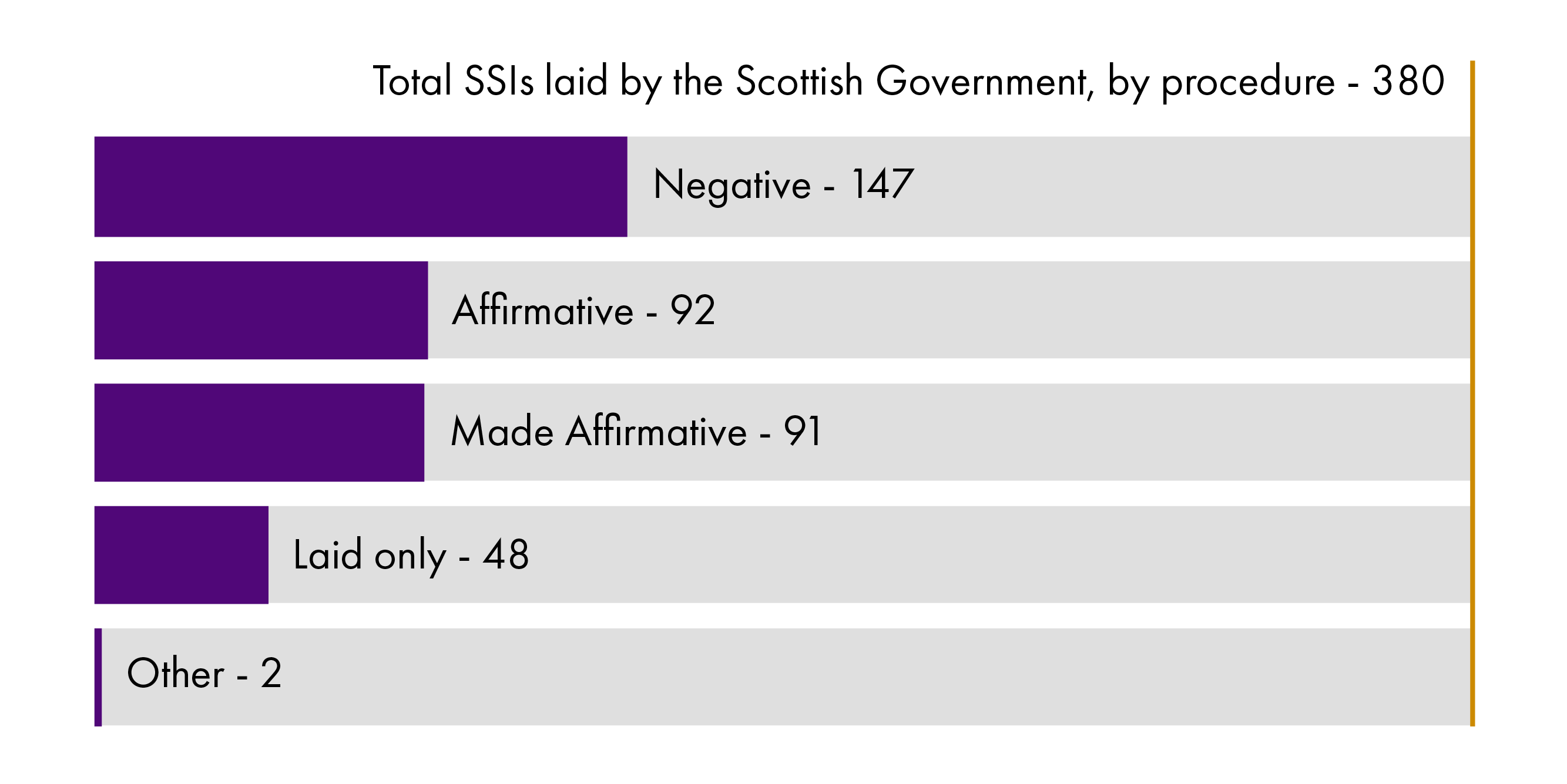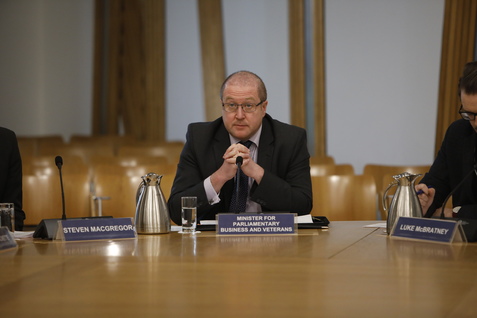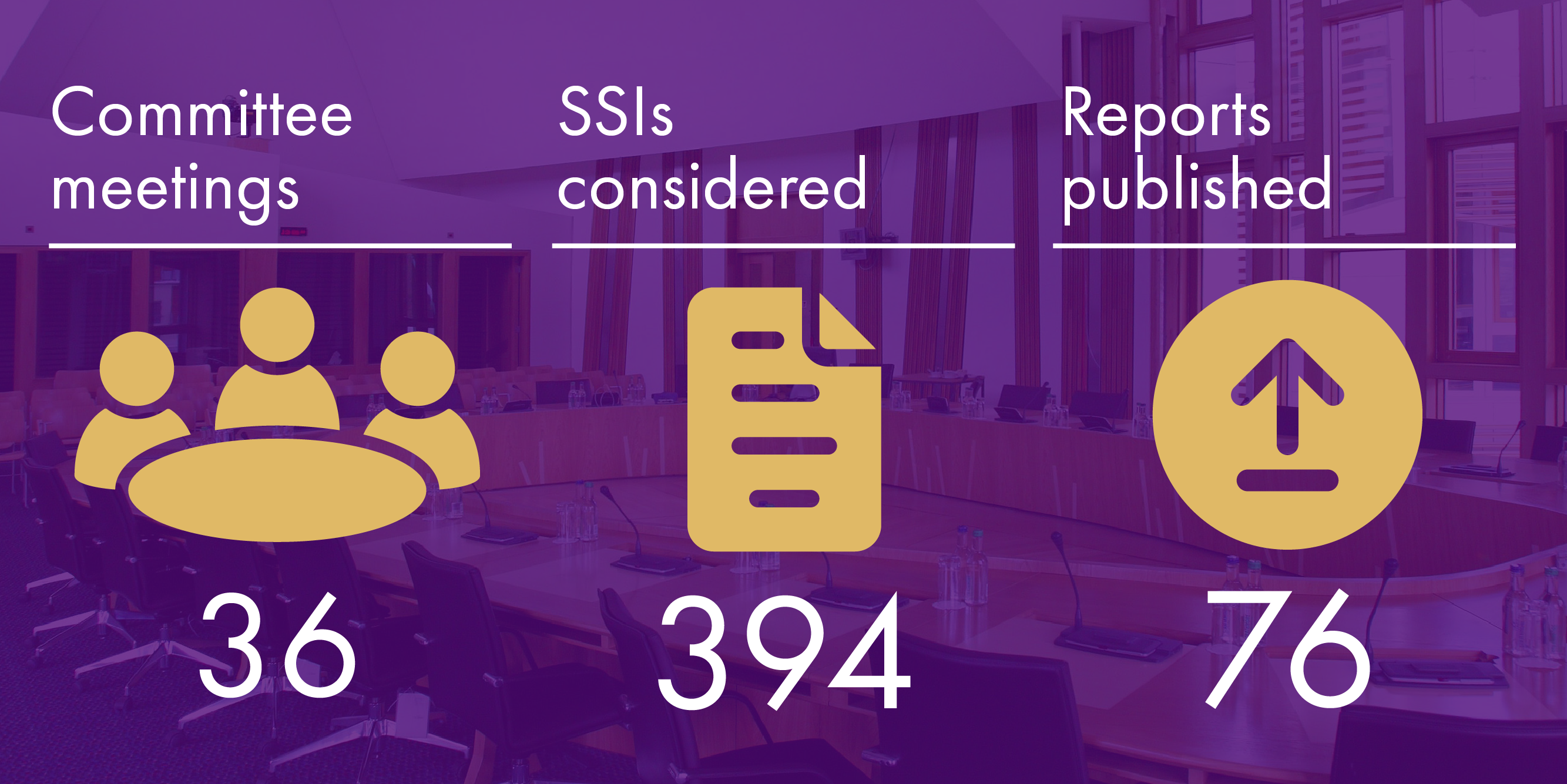Delegated Powers and Law Reform Committee
Delegated Powers and Law Reform Committee Annual Report 2020-21
Introduction
This Report covers the work of the Committee during the parliamentary year from 12 May 2020 to 24 March 2021. The Committee continues to scrutinise Scottish Statutory Instruments ('SSIs'), delegated powers provisions within bills at Stage 1 and after Stage 2 as well as UK bills which contains provisions conferring on the Scottish Ministers powers to make subordinate legislation.

Membership changes
Previous Members of the Committee during the reporting year:
Gordon Lindhurst (from 25 February to 25 August 2020); and
Stuart McMillan (from 14 June 2016 to to 22 December 2020).
The Committee is extremely thankful for the contributions of Gordon and Stuart to the work of the Committee.
Bills
Introduction
The Committee considers delegated powers provisions in Scottish Government and Members’ bills. It then reports to subject committees and the Parliament on issues such as the scope of delegated powers and whether parliamentary procedure that would apply to subordinate legislation brought under the power would offer the appropriate level of scrutiny.
Through its scrutiny process, the Committee aims to ensure that the appropriate balance between primary and secondary legislation within bills is maintained and that the Parliament will have appropriate scrutiny of subordinate legislation.
Bills considered by the Committee
Over the reporting period, the Committee considered and reported on 21 bills at Stage 1:
Civil Partnership (Scotland) Bill
Hate Crime and Public Order (Scotland) Bill
Liability for NHS Charges (Treatment of Industrial Disease) (Scotland) Bill
Scottish Parliament (Assistance for Political Parties) Bill
Social Security Administration and Tribunal Membership (Scotland) Bill
Tied Pubs (Scotland) Bill
Travelling Funfairs (Licensing) (Scotland) Bill
Dogs (Protection of Livestock) (Amendment) (Scotland) Bill
Domestic Abuse (Protection) (Scotland) Bill
Heat Networks (Scotland) Bill
Liability for NHS Charges (Treatment of Industrial Disease) (Scotland) Bill
Post-mortem Examinations (Defence Time Limits) (Scotland) Bill
Redress for Survivors (Historical Child Abuse in Care) (Scotland) Bill
Travelling Funfairs (Licensing) (Scotland) Bill
UK Withdrawal from the European Union (Continuity) (Scotland) Bill:
Welfare of Dogs (Scotland) Bill
Budget (Scotland) (No.5) Bill
Culpable Homicide (Scotland) Bill
Disabled Children and Young People (Transitions to Adulthood) (Scotland) Bill
European Charter of Local Self-Government (Incorporation) (Scotland) Bill
The United Nations Convention on the Rights of the Child (Incorporation) (Scotland) Bill
The Committee also considered and reported on 13 bills after Stage 2:
Animals and Wildlife (Penalties, Protections and Powers) Bill
Children (Scotland) Bill
Civil Partnership (Scotland) Bill
Period Products (Free Provision) (Scotland) Bill
Defamation and Malicious Publication (Scotland) Bill
Forensic Medical Services (Victims of Sexual Offences) (Scotland) Bill
Heat Networks (Scotland) Bill
UK Withdrawal from the European Union (Continuity) (Scotland) Bill
Hate Crime and Public Order (Scotland) Bill
Redress for Survivors (Historical Child Abuse in Care) (Scotland) Bill
European Charter of Local Self-Government (Incorporation) (Scotland) Bill
United Nations Convention on the Rights of the Child (Incorporation) (Scotland) Bill
Dogs (Protection of Livestock) (Amendment) (Scotland) Bill
Legislative Consent Memorandums
Introduction
Legislative Consent Memorandums ('LCMs') are related to UK Parliament bills which seek to change the law or alter Scottish Ministers’ or the Scottish Parliament’s powers in relation to devolved matters.
The Committee considered and reported on nine LCM's :
Agriculture Bill
Private International Law (Implementation of Agreements) Bill
Corporate Insolvency and Governance Bill
Environment Bill
Fisheries Bill
Immigration and Social Security Co-ordination (EU Withdrawal) Bill
Trade Bill
Internal Market Bill
Covert Human Intelligence Sources (Criminal Conduct) Bill
COVID-19 legislation
In March 2020 (during the previous parliamentary year) the Committee considered the powers to make subordinate legislation conferred on Scottish Ministers in the UK Coronavirus Bill (now Coronavirus Act 2020). Shortly afterwards the Scottish Parliament considered the Coronavirus (Scotland) Bill. This was deemed an Emergency Bill, and all stages of the Bill wee considered on 1 April 2020.
The subsequent Coronavirus (Scotland) (No.2) Bill was also designated as an Emergency Bill, given the extent of the delegated powers in the proposed legislation the Committee was keen to consider whether there were any issues which it should highlight to the COVID-19 Committee ahead of its report on the Bill. It therefore wrote to both the COVID-19 Committee and the Cabinet Secretary for Government Business and Constitutional Relations with its findings. The Committee recommended that:
…it would be beneficial in the interests of effective scrutiny if the Scottish Government would review and report to the Scottish Parliament on all subordinate legislation made in response to the Coronavirus emergency, as if it were made under provisions of the Scottish Coronavirus Act or this Bill.
A subsequent amendment to the Bill led to a requirement for Scottish Ministers to report on the status of certain provisions. The Committee has since considered four reports on 'The Coronavirus Acts: Report to Scottish Parliament'. It has written to the COVID-19 Committee with its findings on each of these reports.
Also, in part because of suggestions made by the Committee, a Minister also provides details of each coronavirus SSI considered in the Chamber prior to the motion being considered by Parliament.
Law Reform
The Committee published its report on its review of the Presiding Officer’s determination to identify a Scottish Law Commission Bill as defined in Rule 9.17A of Standing Orders in November 2020.
In December 2020, the Presiding Officer invited the Standards, Procedures and Public Appointments Committee ('SPPA Committee') to examine the findings of the Committee’s review.
The Convener gave evidence to the SPPA Committee on 14 January 2021. It then wrote to the Presiding Officer to confirm that it was content with the revised determination.
Subordinate Legislation
The Committee considered 394 SSIs during this parliamentary year; a rise in 34% of SSIs considered in the 2019-20 parliamentary year period.
Working to tight timescales, the Committee also produced 36 SSI reports.
380 of these instruments were laid by the Scottish Government and 14 by the Lord President's Private Office.
In relation to the 380 instruments laid by the Scottish Government:
92 were subject to affirmative procedure;
91 were subject to made affirmative procedure (the reason for the rise is due to the requirement for made affirmative instruments during the pandemic so as to allow the Government to respond quickly to the many challenges presented by coronavirus);
147 were subject to negative procedure;
48 were not subject to any parliamentary procedure (Laid only); and
2 instruments/document subject to approval.

The significant rise in the number of SSIs considered in this parliamentary year is primarily due to instruments laid in relation to the UK leaving the EU and those laid in response to the coronavirus.
Instruments considered under the European Union (Withdrawal) Act 2018
The Committee considered 28 instruments laid under schedule 2 of the European Union (Withdrawal) Act 2018 (“the 2018 Act”). These instruments were considered in terms of the protocol agreed with the Scottish Government and approved by the Committee. The protocol requires each instrument laid under schedule 2 the 2018 Act to be considered in terms of the scrutiny procedure attached to the instrument by the Government and the Government’s assessment of the instrument’s significance in terms of policy impact.
Of these 28 instruments, the Committee was content in all cases with the procedure chosen by the Scottish Government. On one occasion, the Committee recommended that the Scottish Government’s categorisation of an instrument be raised from Medium to High significance.
Meetings
The Committee met 36 times during the parliamentary year.
As a result of the coronavirus pandemic:
25 of these meetings were held as 'hybrid meetings'. Some Members participated in the meeting in person in the Scottish Parliament and others participated remotely via the ‘bluejeans’ online platform; and
11 meetings were held wholly virtually via ‘bluejeans’.
Of these meetings, none were entirely in private and five were entirely in public. The main reasons for taking business in private were to consider the Committee’s approach to delegated powers in bills, to consider draft reports or to consider oral evidence heard earlier in the meeting.

The Committee held one evidence session during this Parliamentary year:
Graeme Dey MSP, Minister for Parliamentary Business and Veterans on the work of the Committee in the parliamentary year 2019-20 (29 September 2020).
The Committee published a total of 76 reports over this parliamentary year.

Equalities
The Committee considers equalities issues which can arise under the European Convention on Human Rights and under Community law. It is part of the Committee's remit to draw the attention of lead committees and the parliament to any instrument that, in its opinion, fails to comply with any such requirement.
Gender Diversity Information
Of the 6 witnesses who appeared before the Committee, 3 were female and 3 were male. These witnesses were made up from the evidence session with the Minister for Parliamentary Business and Veterans as identified in the previous section, and the officials who accompanied him.